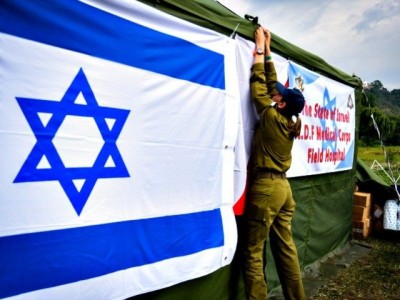Israel Seeks in Nepal to Whitewash its Crimes in Gaza

Israel’s prime minister, Benjamin Netanyahu, was quick to congratulate Israeli soldiers on their relief efforts in Nepal, where an earthquake late last month claimed many thousands of lives.
“These are the true faces of Israel,” he said of a 260-strong team that arrived to pull survivors from the rubble, treat the injured, help deliver babies, and entertain traumatised children. Israel’s field hospital in Kathmandu was the biggest and best-equipped after India’s, Nepal’s large neighbour.
Similar relief operations by Israel were prominent in Haiti after its 2010 earthquake, in Japan a year later after a quake there, and in 2013 when a typhoon wrecked the Philippines.
Israel’s humanitarian concern for the victims of disasters, however, looks more cynical when set alongside its record once the TV cameras depart. Israel’s international aid budget is paltry compared to that of other developed nations.
There has to be at least a suspicion that Israel is exploiting natural catastrophes to win itself new international friends and try to refute global opinion surveys that regularly identify Israel as a major threat to world peace.
The message is aimed at a domestic audience too. As commentator Gideon Levy observed, Israelis are being reassured that, despite the evidence, they really do have the “most moral army in the world”.
The criticism that Israel is demonstrating selective compassion –bringing salvation to far-off Nepal while smashing homes and cutting down lives close by in Gaza – is blithely dismissed by most Israelis. “Nepal is not firing rockets on our cities; it has not elected terrorists to run its government,” so the narrative goes. But the hollowness of these self-serving arguments has been illustrated by events of the past few days.
Netanyahu’s new rightwing government – characterised by the Haaretz daily as Israel’s most “dangerous” yet – is the first since the Oslo accords were signed more than 20 years ago that has dropped the pretence of wanting to resolve Israel’s conflict with the Palestinians. During the election campaign, Netanyahu vowed there would be no Palestinian state on his watch.
That is the main context for assessing the entirely manmade disaster Israel created in Gaza last summer, when it killed more than 2,100 Palestinians, including some 500 children, and wrecked vast swaths of the built-up landscape.
If Israel claims it is distinguishing between the suffering of innocent Nepalese and armed Palestinians, it has to explain the testimonies of serving soldiers published last week. They say their orders in Gaza were to shoot indiscriminately on any Palestinian they met, whether armed or not.
A recent report by the Association of International Development Agencies found eight months after the Gaza operation that 12,000 homes still had to be rebuilt and 100,000 Palestinians – one in 18 – were homeless.
The chief reason ordinary Palestinians, unlike the Nepalese, cannot begin to rebuild their lives after their own catastrophe is because Israel maintains a savage siege – a form of collective punishment – on the coastal enclave.
While Nepal embraces anyone offering help, for nearly a decade Israel has threatened and attacked any humanitarian group trying to reach Gaza. In 2010 Israel killed nine activists on the high seas as they tried to bring medicine and food to the sick and destitute there.
The UN, meanwhile, is considering listing the Israeli army alongside Islamic State (ISIL) and Boko Haram as a serious violator of children’s rights for the attack on Gaza.
But Israel’s humanitarian double standards do not apply only to the tiny enclave.
In recent days, Israeli courts have approved the uprooting of whole Palestinian communities – from Sussiya in the West Bank to Umm al-Hiran in Israel – so that Jews can live in their place. It has also backed government plans to confiscate arbitrarily Palestinian properties in East Jerusalem.
Where is the humanitarian concern for these Palestinians, including those who have Israeli citizenship, as they are left displaced and homeless? They have never fired a rocket and most have never voted for Hamas.
The answer is provided by members of the new government. Rabbi Eli Ben-Dahan, the minister overseeing the occupation bureaucracy, has called Palestinians “beasts, they are not human”. The new justice minister, Ayelet Shaked, urged a genocide last year, demanding the slaughter of Palestinian “snakes”.
Another large group of non-Jews in Israel is faring barely better. In violation of international law, Israel is jailing and deporting African asylum seekers, often returning them to regions they fled in fear of their lives – over the protestations of UN officials.
Reuven Rivlin, Israel’s president, described the soldiers in Nepal as “ministering angels” representing “the universal values of our people and our country”.
Nothing could be further from the truth. Israel’s government and its army represent not universal values but a tribal allegiance to a state that always asks first: “What is good for a Jewish Israel?”
When most Israelis sanctify a Jewish fortress-state, the decision to send soldiers half way around the world to offer help in front of the TV cameras is an easy generosity. It is far harder to recognise the humanity of fellow human beings who share the same small patch of land Israel claims as its exclusive home.
The efforts of Israeli soldiers to save children in Nepal should be commended – but not if it gives them and their compatriots an excuse to turn a blind eye to Palestinian children suffering amid the rubble of Gaza.
Jonathan Cook won the Martha Gellhorn Special Prize for Journalism. His latest books are “Israel and the Clash of Civilisations: Iraq, Iran and the Plan to Remake the Middle East” (Pluto Press) and “Disappearing Palestine: Israel’s Experiments in Human Despair” (Zed Books). His website is www.jonathan-cook.net.
A version of this article first appeared in the National, Abu Dhabi.

